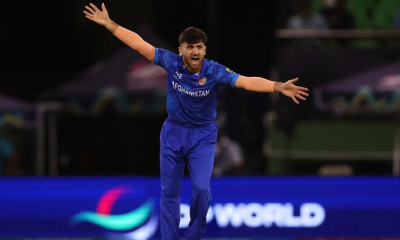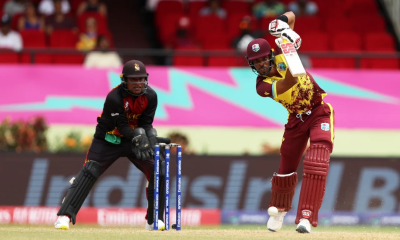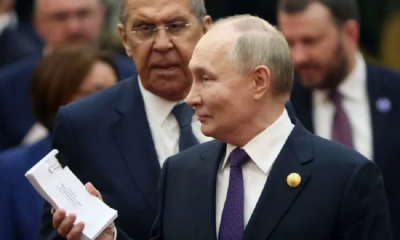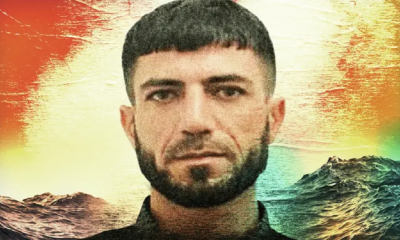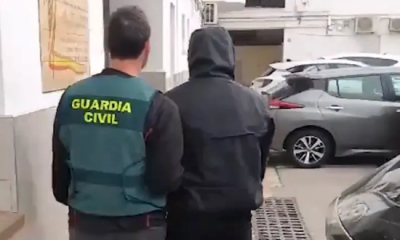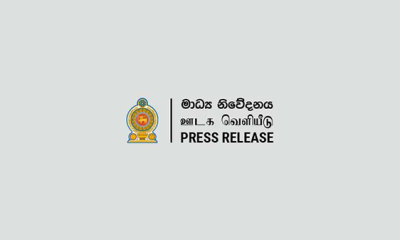Foreign News
UK to send warship to South America amid Venezuela tensions
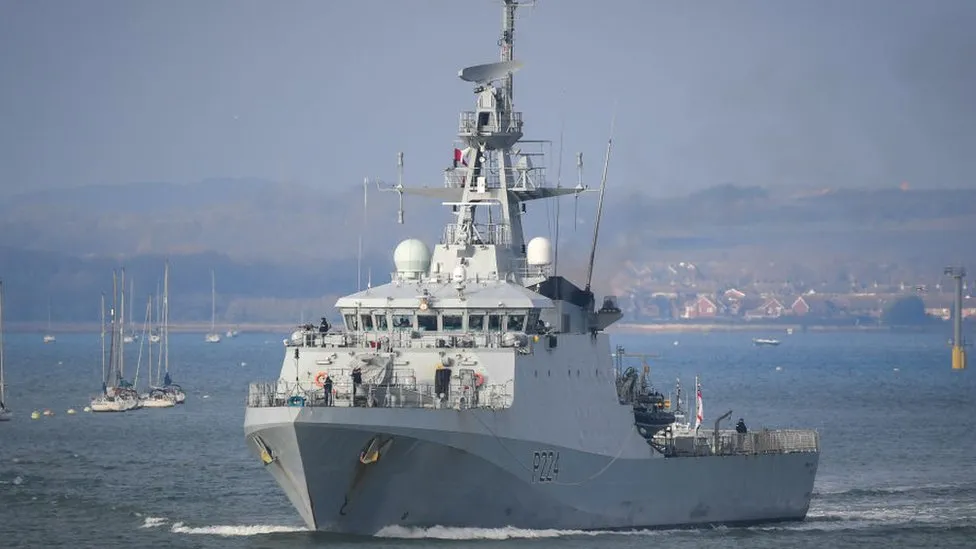
The UK is preparing to send a warship to Guyana in a show of diplomatic and military support for the former British colony, the BBC has learned.
It comes after neighbouring Venezuela renewed its claim for a disputed part of Guyanese territory that is rich in oil and minerals.
The Ministry of Defence confirmed HMS Trent would take part in joint exercises after Christmas.
Guyana, a Commonwealth member, is South America’s only English-speaking nation.
HMS Trent – an offshore patrol vessel – had been deployed to the Caribbean to search for drug smugglers but was re-tasked after Venezuela’s government threatened to annex the Essequibo region of Guyana earlier this month.
This raised fears that Venezuela might invade and spark the first interstate war in South America since the Falklands Conflict in 1982.
Venezuela has long claimed ownership of Essequibo, a 61,000 square mile region which comprises about two-thirds of Guyana. Its hills and jungles are rich in gold, diamonds and bauxite, while huge oil deposits have been found off its coast.
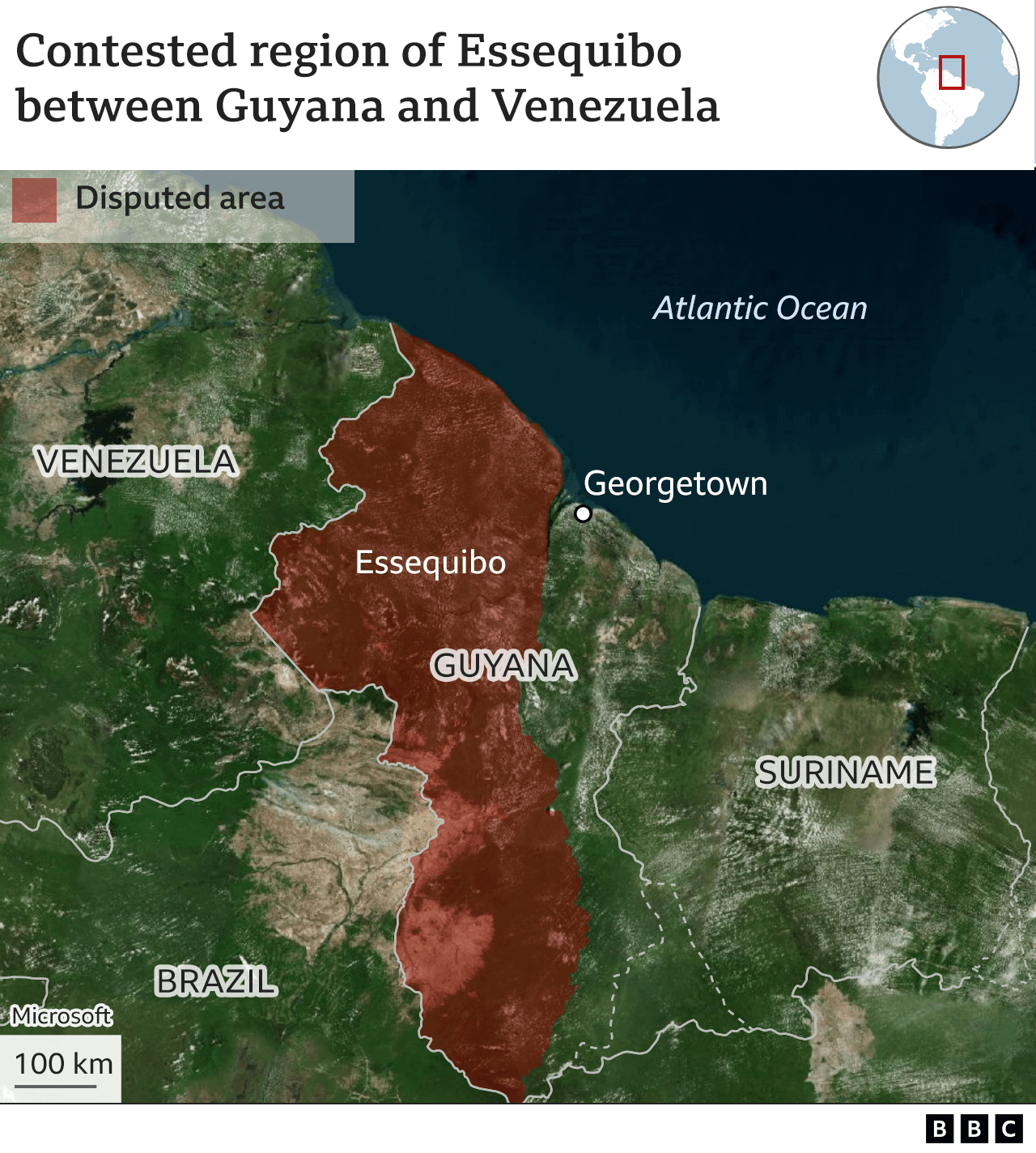
While Guyana’s economy is growing fast, Venezuela’s is suffering.
Nicolas Maduro, the president of Venezuela, staged a referendum on 3 December to assert popular support for his country’s claim to Essequibo. The result was widely challenged and disputed but he nonetheless published new maps and legislation showing Essequibo as part of Venezuela, named a new governor and offered identity cards to those living in the sparsely populated region.
He has also ordered the state oil company to issue extraction licences.
The Venezuelan president has subsequently met Guyana’s President, Irfaan Ali, and agreed not to use force, but he has maintained his territorial claim and both sides are still at odds over how the border dispute could be settled legally.
This week the Lloyd’s insurance market in London added Guyana to its list of riskiest shipping zones.
A Ministry of Defence spokesperson told the BBC: “HMS Trent will visit regional ally and Commonwealth partner Guyana later this month as part of a series of engagements in the region during her Atlantic Patrol Task deployment.”
HMS Trent has a crew of 65, a top speed of 24 knots and a range of 5,000 nautical miles.It is armed with 30mm cannon and a contingent of Royal Marines. It can also deploy Merlin helicopters and unmanned aircraft.
HMS Trent left its home port of Gibraltar in early December and is currently alongside in Bridgetown, Barbados for Christmas.
The warship is expected to anchor off the capital of Guyana, Georgetown, and conduct visits, joint activities and training with the country’s navy and other allies. It cannot go alongside because the port is too shallow.
The vessel is mainly used for tackling piracy and smuggling, protecting fisheries, counter-terrorism, providing humanitarian aid, and search and rescue operations, but the Royal Navy says it is also designed for border patrols and defence diplomacy.
The decision to send HMS Trent to Guyana is part of a growing UK effort to show international diplomatic support for Guyana.
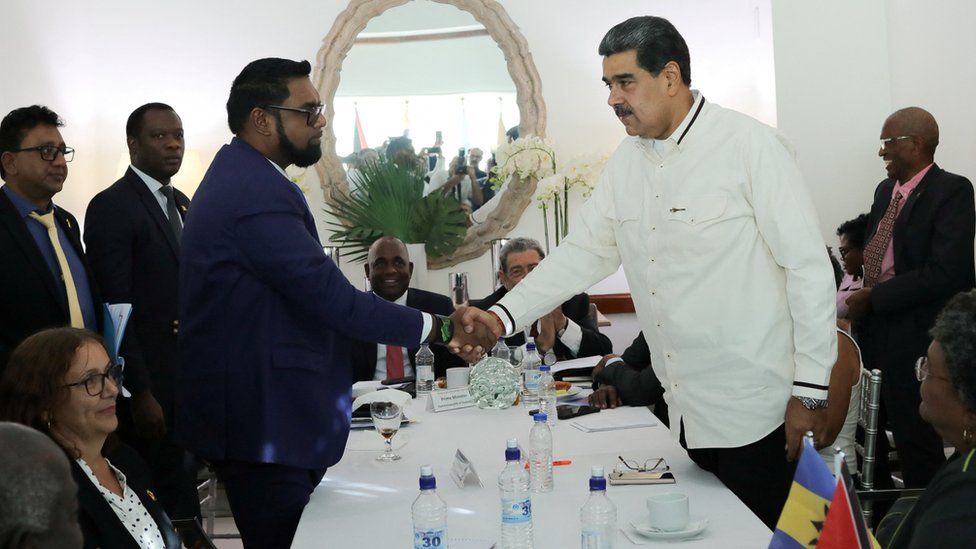
This week the Foreign Secretary Lord Cameron said the UK would “continue to work with partners in the region to ensure the territorial integrity of Guyana is upheld and prevent escalation”.
David Rutley, the Foreign Office Minister for the Americas, visited Georgetown on 18 December, the first G7 representative to do so since Venezuela renewed its claim. He promised Guyana the UK’s “unequivocal backing” and welcomed Venezuela’s promise to avoid using force.
Mr Rutley continued: “The border issue has been settled for over 120 years. Sovereign borders must be respected wherever they are in the world. “The UK will continue to work with partners in the region, as well as through international bodies, to ensure the territorial integrity of Guyana is upheld.”
Venezuela’s Foreign Minister, Yvan Gil, criticised the visit, accusing the UK of destabilising the region. In a post on X – formerly Twitter – he said: “The former invading and enslaving empire, which illegally occupied the territory of Guayana Esequiba and acted in a skillful and sneaky manner against the interests of Venezuela, insists on intervening in a territorial controversy that they themselves generated.”
Venezuela disputes the border which was established under an international agreement in 1899.
Guyana was formerly known as British Guiana before it secured its independence in 1966.
(BBC)
Foreign News
How Trump pulled off an incredible comeback
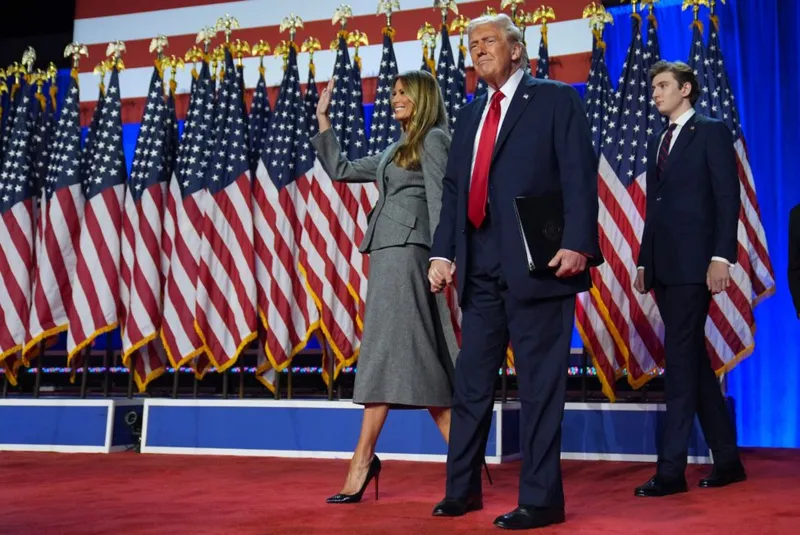
This is surely the most dramatic comeback in US political history.
Four years after leaving the White House, Donald Trump is set to move back in, after millions of Americans voted to give him a second chance.
The election campaign was one for the history books: he survived two assassination attempts and his original opponent President Joe Biden dropped out just months before election day.
Although final votes are still being counted, the majority of Americans in key battleground states chose to vote for him, with many citing the economy and immigration as a chief concern.
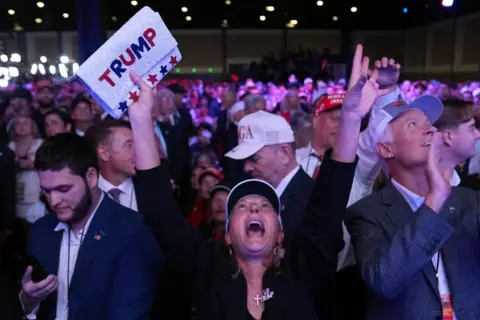
His triumph comes after a spectacular fall. He refused to accept the results of the 2020 election, which he lost to Biden, and his role in trying to overturn the election results to stay in office is still being scrutinised today.
He faces charges for allegedly inciting the violent attack on the US Capitol on the 6 January 2021. And he will also make history as the first sitting president to have been convicted of a felony, after being found guilty of falsifying business records.
It’s not hard to see why he is a deeply polarising figure.
Throughout the campaign, Trump used incendiary rhetoric – making crass jokes and threatening vengeance against his political enemies.
His message on the economy touched a chord
Few people have a middle ground when it comes to Trump. Most of the voters I spoke to during the course of this campaign said they wished he would “shut his potty mouth” – but they were able to look past it.
Instead, they focused on the question he asked at every rally. “Are you better off now than you were two years ago?”
So many people who voted for Donald Trump told me again and again that they felt the economy was much better when he was in office and they were sick of trying to make ends meet. Although much of the cause of inflation was due to outside forces such as the Covid-19 pandemic, they blamed the outgoing administration.
Voters were also deeply concerned about illegal immigration which had reached record levels under Biden. They usually didn’t express racist views or believe that migrants were eating people’s pets, as Trump and his supporters had claimed. They just wanted much stronger border enforcement.
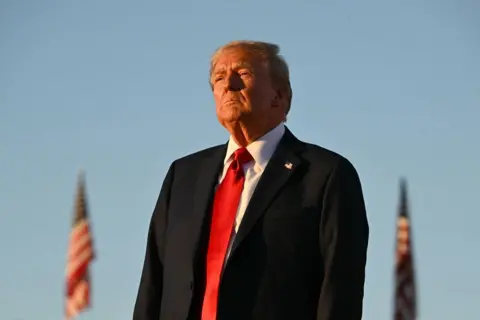
‘America first’ for a second Trump term
“America first” was another one of Trump’s slogans that really seemed to strike a chord with voters. All over the country I heard people – on the left and right – complaining about billions of dollars being spent on supporting Ukraine when they thought that money would be much better spent at home.
In the end, they just couldn’t vote for Harris, who served as Biden’s vice-president for four years. They believed it would be more of the same, and they wanted change.
It is perhaps one of the ironies of this election that the candidate who most represented change was himself in power just four years ago. But there are several differences between then and now.
When he first came into power in 2016, he was a political outsider, and, at least for a while, he surrounded himself with veteran political advisers and staff who showed him the ropes and constrained his actions. Now he doesn’t seem that interested in playing by the rules of the game.
Many of these same advisers and staff have spoken out – calling him a “liar”, a “fascist” and “unfit”. They have cautioned that if he surrounds himself with loyalists, which he is expected to do, that there will be no one to restrain him from his more extreme ideas.
When he left office, he faced a litany of criminal charges related to his role in the Capitol riots, how he handled documents pertaining to national security, and hush money payments to a porn star.
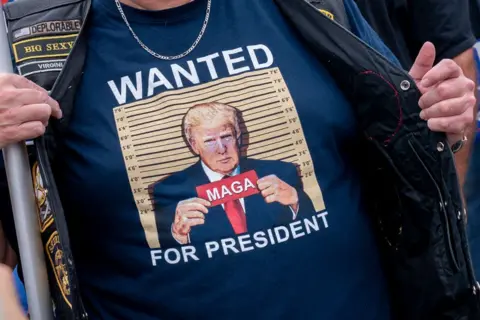
But since the Supreme Court ruled that the president has total immunity from prosecution for official acts in office, it will be an uphill battle for any prosecutor to charge him during the next administration.
And as president, he could instruct his justice department to drop the federal charges against him relating to the 6 January riots so he doesn’t have to worry about a jail sentence. At the same time, he could pardon hundreds of people sentenced to prison for their part in the Capitol Riots.
In the end, voters were presented with two versions of America.
Donald Trump told them that their country was a failing nation that only he could Make Great Again.
Meanwhile, Harris cautioned that if Trump was elected, American democracy itself would face an existential threat. That remains to be seen. But what Trump said himself during the campaign has not exactly assuaged people’s fears.
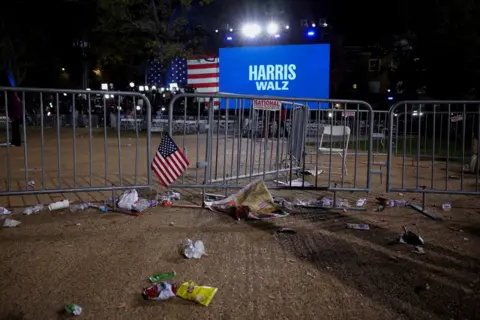
He has heaped praise on authoritarian leaders like Russia’s Vladimir Putin and North Korea’s Kim Jong Un, whom he said were “at the top of their game, whether you like it or not”.
He has talked about trying to silence critics in the press. Just days before the election, he also made comments that implied he wouldn’t mind if members of the media were killed.
And he has continued to amplify conspiracy theories and unfounded claims of election fraud – even though the election ultimately led to his victory.
Now, voters will find how much of what he said during the campaign was just loose talk – “Trump being Trump”. And remember: it’s not just Americans who have to confront the reality of a second Trump term.
The rest of the world will now discover what “America First” really means. From the global economic consequences of 20% tariffs that he has proposed on US imports to the wars in Ukraine and the Middle East that he has vowed to end – regardless of which side wins.
Donald Trump did not manage to implement all of his plans in his first term. Now with a second mandate and significantly less encumbered, America, and the world, will see what he can really do.
[BBC]
Foreign News
Top climber falls to death after rare Himalayan feat

A leading Slovak mountain climber has died while descending a 7,234m (23,730ft) peak in Nepal, after completing the rare feat of scaling the mountain’s perilous eastern face.
Ondrej Huserka fell into a crevasse on Thursday, after he and his climbing partner ascended the Langtang Lirung mountain in the Himalayas – the 99th-highest peak in the world. The 34-year-old mountaineer had previously climbed in the Alps, Patagonia and the Pamir Mountains.
His Czech climbing partner Marek Holecek said the pair were returning to base after becoming the first mountaineers to ascend Langtang Lirung via a “terrifying” eastern route.
While rappelling a mountain wall, Mr Huserka’s rope snapped and he fell into an ice crevasse, his partner said in an emotional Facebook update posted after he returned alone.
He then “hit an angled surface after an 8m drop, then continued down a labyrinth into the depths of the glacier”.
In the Facebook post, Mr Holecek recalled hearing his partner’s cries for help and desperately trying to save him. “I rappelled down to him and stayed with him for four hours until his light faded,” Mr Holecek said.
After freeing him from the ice, Mr Holecek realised his partner was paralysed. “His star was fading as he lay in my arms,” he said.
The Slovak climbers’ association, SHS James, said adverse weather in Nepal had prevented rescue action.
“Following a phone call with Marek Holecek and his status published yesterday, and given the weather conditions under Langtang Lirung, the family and friends will have to cope with the fact that Ondrej is not with us any more,” it said in a social media post.
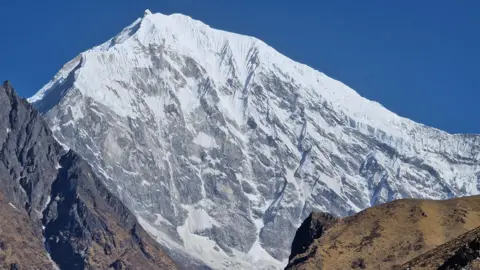
The Langtang Lirung mountain sits alongside other peaks in the Nepalese Himalayas and is a popular trekking destination.
Judith Swift, a climber who visited Langtang in the spring of this this year, said it was described to her by a local Nepalese Sherpa as “the killer mountain”. “Not many people have summited it and many, including now sadly Ondrej Huserka, have died climbing it,” she told the BBC.
Mr Huserka joined the Slovak national alpinism team in 2011 and won the SHS James best ascent of the year award six times, according to his personal website. His decade-long mountaineering career took him around the world.
He completed the first ascent of the “Summer Bouquet” on Alexander Block Peak in Kyrgyzstan, and repeated a “legendary route” on the Cerro Torre’s south-east ridge in South America, his website says.
Paying tribute to the late climber, SHS James said Mr Huserka was a “top alpinist” and “world-class”.
The Slovak Spectator said he was “one of the best Slovak mountaineers”.
[BBC]
Foreign News
Boeing strike ends as workers back 38% pay rise deal
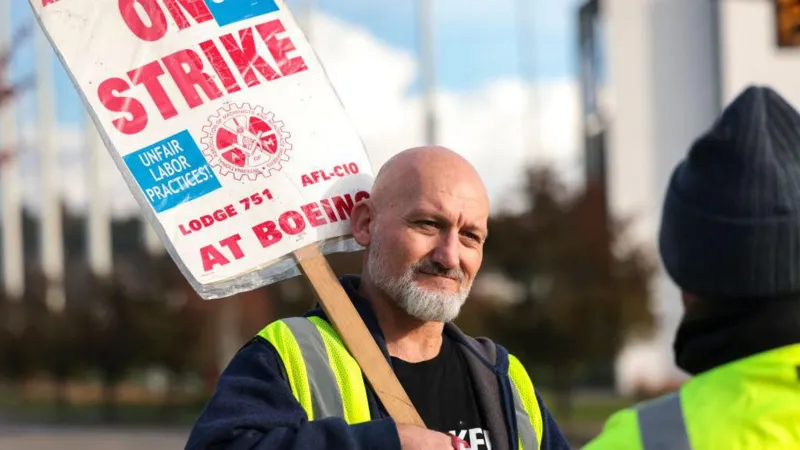
Boeing workers have voted to accept the aviation giant’s latest pay offer, ending a damaging seven-week-long walkout.
Under the new contract, they will get a 38% pay rise over the next four years.
Striking workers can start returning to their jobs as early as Wednesday, or as late as 12 November, the International Association of Machinists and Aerospace Workers (IAM) union says.
The walkout by around 30,000 Boeing workers started on 13 September, leading to a dramatic slowdown at the plane maker’s factories and deepening a crisis at the company.
IAM said 59% of striking workers voted in favour of the new deal, which also includes a one-off $12,000 (£9,300) bonus, as well as changes to workers’ retirement plans.
“Through this victory and the strike that made it possible, IAM members have taken a stand for respect and fair wages in the workplace,” union leader Jon Holden said.
The union had previously called for a 40% pay increase and workers had rejected two previous offers from the company.
“While the past few months have been difficult for all of us, we are all part of the same team,” said Boeing’s chief executive Kelly Ortberg.
“There is much work ahead to return to the excellence that made Boeing an iconic company.”
In a sign of how seriously the White House took the strike at one of the country’s most important companies, acting US Labor Secretary Julie Su flew to Seattle last month to help with negotiations.
Boeing has been trying to shore up its finances and end the strike, which has now cost it nearly $10bn, according to consulting firm Anderson Economic Group.
In October, its commercial aircraft business reported operating losses of $4bn for the three months to the end of September.
Last week, the firm launched a share sale to raise more than $20bn.
It came after warnings that a prolonged strike could lead to downgrades of Boeing’s credit rating, which would make it more expensive for it to borrow money.
Last month, the firm said it would lay off around 17,000 workers, with the first redundancy notices expected to be issued in mid-November.
The latest crisis at Boeing erupted in January with a dramatic mid-air blowout of a piece of one of its passenger planes.
Its space business also suffered a reputational hit after its Starliner vessel was forced to return to Earth without carrying astronauts.
[BBC]
-

 Business6 days ago
Business6 days agoStandard Chartered appoints Harini Jayaweera as Chief Compliance Officer
-
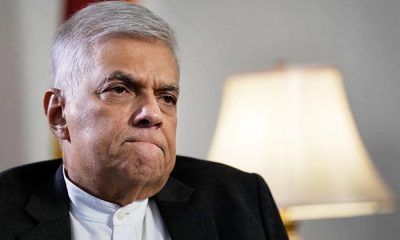
 News7 days ago
News7 days agoWickremesinghe defends former presidents’ privileges
-
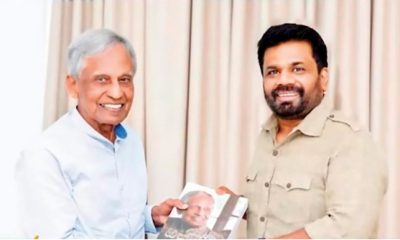
 Opinion7 days ago
Opinion7 days agoDevolution and Comrade Anura
-

 News5 days ago
News5 days agoFifteen heads of Sri Lanka missions overseas urgently recalled
-

 News5 days ago
News5 days agoFive-star hotels stop serving pork products
-
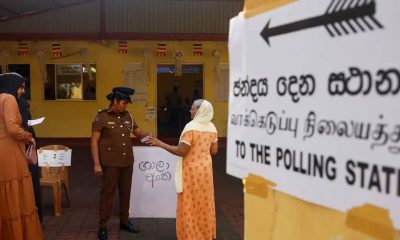
 Features5 days ago
Features5 days agoWaiting for a Democratic Opposition
-
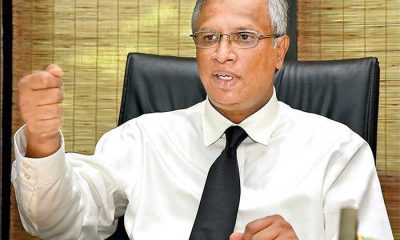
 News4 days ago
News4 days agoITAK denies secret pact with NPP
-

 Sports7 days ago
Sports7 days agoChamika, Anuka shine as Mahanama beat Nalanda


